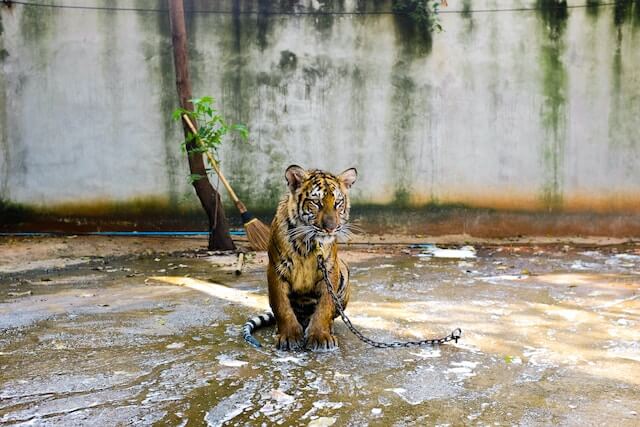Did you know: Since 1990, 126 captive big cats and 23 humans have died in the U.S. because of keeping these animals in captivity. We only know the death but we have no instruments to measure the abuse and sufferings animals are going through.
The tiger is a fierce and powerful predator. The tiger is an apex predator, meaning they are both at the top of a food chain with no natural predators of their own. Both have sharp paws and teeth, suitable for tearing flesh from their prey and are expert hunters. There is still a debate about whether it’s the tiger or lion that’s the king of the jungle but let’s put the debate aside and discuss something that serious on International Tiger Day 2023.
Who are king tigers?
The king tiger means powerful, dynamic, mighty, and tough. Tiger is a symbol of power. They are cautious and energetic. Solitary, marking and defending its territory. Universally respected and admired for its courage by both friends and foes. With so much strength and power never have we thought that a tiger could be the victim of animal cruelty.
How are Tiger victims of animal cruelty?
The pleasure and exploration of we humans never end, and this always comes with the price paid by animals and the environment. Imagine a tiger being the kind of jungle suffering so much that we can’t even imagine how other weak animals are being treated and used by humans. Big cats like tigers are used for tourist photos and are often chained, beaten, and drugged for submission. When they become too big, they’re left in cages, sold to zoos or black markets, or slaughtered for various purposes. Never take selfies with wild animals.
The dark reality behind movies
Animal abuse on the set of Hollywood movies has been a controversial topic for decades. the issue made national news when The issue made national news in 2017 when TMZ published a news video from the set of the movie “A Dog’s Purpose” which showed a frightened dog being forced to enter rushing water and being submerged before a crew member yelled “Cut!”. A Dog’s Purpose is just an example we have 100 hundred of movies that claim to be ethical but in some way or other are hurting animals.
Cruelty-free advocates can’t forget the year 2015 when PETA caught Ontario’s Bowmanville Zoological Park owner, Michael Hackenberger, on video brutally whipping a Siberian tiger named Uno around 20 times during a training session. The young tiger was left traumatized, exhibiting a fear response common in big cats. Cruel trainers always assert that punishment is the only way to force an animal to perform.
US and Canada are the developed nations where human and animal rights are talked about most. What about nations like India? Who will fight for animal rights there? Bollywood is the unofficial term for India’s Hindi film industry. Bollywood produces more than 1000 films every year. India is one of the world’s largest cinema entertainment marketplaces and produces more than 1000 films every year. With small and bigger banner movies being produced there is still no trusted mechanism check rule and board that guarantee movies are animal cruelty free.
Report Animal Abuse in Film and Television
Why not support Circuses that abuse animals?
Many times we don’t know what our purpose is in life. We just live to live. Sometimes small steps can make a huge impact. Join the movement and take the pledge: Never support animal circuses. Despite flashy promotions targeting families, the reality is that animals endure threats, beatings, isolation, neglect, and abuse in these circuses, all for the sake of profit. By refusing to pay admission fees, we can put an end to their suffering and stand up for a compassionate and cruelty-free future.
- Big cats in circuses endure life in tiny, cramped cages, deprived of space to exercise and play.
- They are carted around in barren cages, robbing them of opportunities to fulfill their basic needs.
- During performances, they suffer whippings and roaring crowds, only briefly escaping their confinement.
- Captivity leads to overweight and psychologically distressed big cats, with some even mutilating themselves.
- Separation from their mothers causes emotional distress for young tigers used in circuses.
- Tigers are denied their natural behaviours, being forced to perform in the daytime without access to water.
- Adult tigers are made to live in unnatural groups, leading to conflicts and injuries.
- Trainers use punishment and food deprivation to train big cats, causing routine abuse.
- Tigers are terrified of fire, yet they are forced to jump through burning hoops as punishment.
- The instinctual fear of fire is overridden by the pain and fear of punishment, making them perform these dangerous tricks.
Keeping tigers as a pet is a cruelty
The exotic “pet” trade is a heart-wrenching industry that inflicts unimaginable suffering on innocent animals. Those who choose to keep tigers as “pets” unknowingly support cruel breeding practices, oblivious to the fact that these majestic creatures can never thrive in captivity. Life as a “pet” is no life at all for these large animals with natural predatory instincts, as no home can replicate the environment they deserve in the wild.
To ensure their own safety, these beautiful beings are declawed and painfully chained. If you have the time, resources, and unwavering commitment to care for an animal, consider adopting a domestic cat or dog from your local shelter, and in doing so, save a life in desperate need of love and compassion.

Cheetahs, tigers and lions have infamously become a status symbol for rich people and this horrible plague is now spreading across the globe. These innocent animals suffer abuse, are kept in small cages without food, and are eventually shot and skinned when they grow too big. Wild animal trade and exploitation are global issues, and those involved are heartless. Cubs are even stolen from Africa, leaving mothers shot and all cubs taken. It’s a tragic and immoral situation, and unfortunately, some regions seem to turn a blind eye to it.
Tigers being farmed for traditional medicines
Tigers are tragically suffering on an alarming scale due to the demand for traditional medicine. Deep-rooted beliefs claim that tiger body parts hold the power to cure everything from cancer to virility issues. However, the truth is that scientifically proven, cruelty-free alternatives are readily available, rendering these archaic practices unnecessary. Shockingly, many tigers in the tourism industry meet a grim fate, being killed for the sole purpose of being used in traditional medicine.
For centuries, tiger parts have found their place in traditional Chinese medicine (TCM). Tiger bones are believed to treat a range of ailments, including ulcers, typhoid, malaria, dysentery, burns, and rheumatism. Whiskers are worn as talismans or protective charms, and toothaches are soothed using them. The tiger’s penis is shamefully sold as a sexual tonic, while its skin is either seen as a trophy or used in clothing to flaunt wealth. It’s time to recognize the fallacy in these outdated practices and embrace modern, ethical alternatives for the well-being of both tigers and ourselves.
Unnatural tiger breeding is cruelty
At these facilities, lion and tiger cubs often suffer from deformities due to inbreeding, leading to heartbreaking cases of missing limbs. The female tigers endure speed breeding, forced to produce far more litters than they would in the wild.
Tragically, breeders prioritize white cubs for sale because they fetch higher prices, while those who don’t meet the colour requirement face dreadful fates: euthanization, inhumane killing, or neglect. It’s a heart-wrenching reality.
Did you know that white tigers have an alarming neonatal mortality rate, with over 80 percent not surviving? They face a myriad of serious health issues, including facial deformities, impaired depth perception, retinal degeneration, abnormal cranial structure, cataracts, cleft palates, mental impairment, kidney problems, cardiac defects, Parkinson’s disease, scoliosis, and other spinal problems. Read more on Truth about White tigers
Summary: International Tiger Day 2023

Despite the celebrations on International Tiger Day 2023, the plight of tigers remains unchanged. In the US, 126 captive big cats and 23 humans have lost their lives due to keeping these animals in captivity since 1990. However, the true extent of animal abuse and suffering remains unknown. Tigers, powerful apex predators, face threats in the form of inhumane breeding practices, confined living conditions, and exploitation of traditional medicine. Even in the world of entertainment, animals like tigers are subjected to cruelty, as seen on Hollywood movie sets and circuses. It is crucial to stand against these practices, promote cruelty-free alternatives, and support reputable sanctuaries to protect the majestic creatures and ensure a compassionate future for them.
Also, read how Sri Lanka is exporting toque macaque monkeys to China to cope with its economic crisis
Yours sincerely,

Panda





